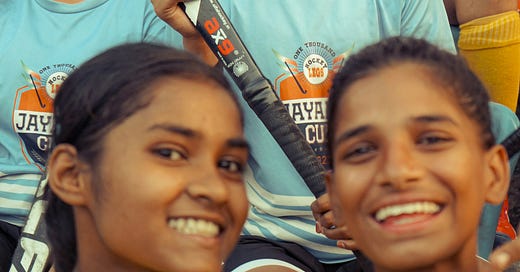India rising - the world's most populous country has big ambitions for its sport
An interview with India journalist and former professional athlete Taruka Srivastav
To those who know little about India, in general how would you characterise the country?
India is a country of vibrant contrasts—steeped in centuries of tradition while racing ahead with rapid modernisation. With a population of over 1.4 billion, it is one of the youngest nations in the world, where diversity in language, religion, and culture also translates into the way sport is consumed and played. Sport in India isn’t just entertainment—it is intertwined with identity, pride, and increasingly, aspiration. India is aiming to become a superpower by 2032.
What sports are popular in India and do people typically engage with them?
Cricket remains by far the most dominant sport in India. From village grounds to stadiums, cricket is deeply embedded in Indian society and garners immense public and commercial attention. However, there has been a notable shift in recent years. Sports like badminton, wrestling, shooting, boxing, athletics, and football have seen a significant rise in viewership and participation, especially due to Olympic success and the growth of franchise leagues. Sports engagement is evolving—from passive viewership to active grassroots participation, particularly in urban and semi-urban areas.
Sport in India appears to be changing, with both state and non-state entities taking an increasing interest in the industry. To what extent is this true?
Yes, sport in India is undergoing a massive transformation. Both state (government bodies, public sector undertakings) and non-state actors (corporates, private leagues, NGOs) are playing growing roles. Initiatives like Khelo India and TOPS Scheme have been pivotal in identifying and supporting young talent, while private leagues such as the IPL (cricket), ISL (football), and Pro Kabaddi have professionalised sports, increased athlete visibility, and attracted commercial investments. Moreover, CSR initiatives and public-private partnerships are increasingly driving infrastructure and sports development at the grassroots.
What are the big challenges and problems facing the Indian sport industry?
Despite progress, Indian sport faces several structural and systemic challenges. These include inadequate infrastructure in rural areas, limited access to quality coaching, inconsistent governance in federations, and lack of financial stability for athletes outside cricket. Gender inequality remains a concern, although more women athletes are emerging and inspiring change. Additionally, balancing commercial interests with athlete welfare and long-term development has improved in the past decade but it continues to be a tightrope walk. India has submitted an Expression of Interest to host the 2030 Commonwealth Games with Ahmedabad selected as the host city. Also, the Indian Olympic Association (IOA) has submitted a 'Letter of Intent', expressing the country's desire to host the 2036 Olympic and Paralympic Games which signals India’s ambition to become a sporting superpower.
Five Key Insights for Sport Industry Leaders in India:
Understand Regional Diversity: India is not one market—each state has its sporting culture, language, and level of development. A hyperlocal approach works best.
Grassroots Investment is Crucial: The future of Indian sport lies in systematic, long-term investment in schools, colleges, and community sports ecosystems.
Leverage Digital and Tech: With rising internet penetration, especially via mobile, sport content and fan engagement strategies must be digital-first.
Empower Women in Sport: From athletes to administrators, promoting gender equity is not just ethical—it’s a growth opportunity.
Transparency & Governance Matter: Sustainable success will depend on accountable, transparent, and athlete-centric governance structures across federations and leagues.
India’s sporting journey is still unfolding, and its potential—both as a market and as a powerhouse—is immense.
Biography
Taruka Srivastav is a former Asian Games athlete and award-winning sports journalist. A British Council GREAT Scholar, she contributes to Stanford University's Sports Equity Lab and has worked with Manchester United, Bundesliga, UNICEF, and the BBC. She is the founder of The Playknox, a platform focused on sports business, branding, and innovation.




